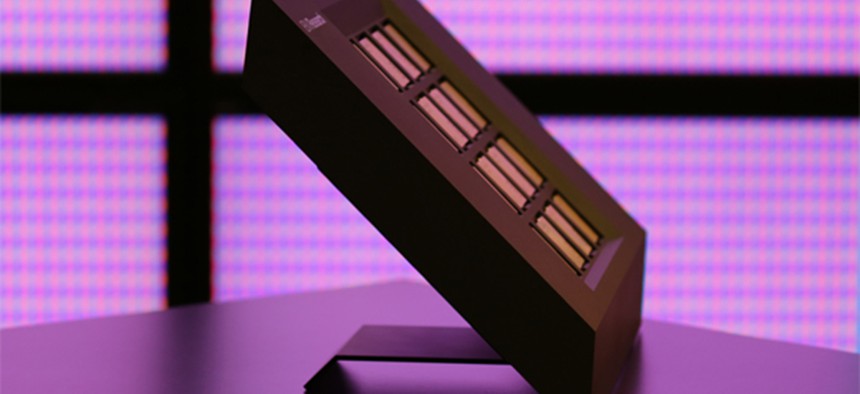Nuclear Lab Buys Brain-Inspired Computing Technology

A 4 by 4 array of IBM TrueNorth chips in an industrial-grade enclosure. IBM Research Flickr
IBM has been hawking the technology in Washington.
Nuclear security programs could soon rely on computing chips inspired by the human brain.
The Lawrence Livermore National Laboratory has signed a contract for a computing system based on IBM’s supercomputing chip TrueNorth, a processor designed to mimic neurons and synapses. The technology could help the lab explore machine learning within the National Nuclear Security Administration and its Advanced Simulation and Computing team, part of the agency’s Stockpile Stewardship Program.
IBM recently has been hawking its “neuromorphic” technology in Washington. Last year, the company’s computer scientists briefed the House Science and National Labs Caucus about its potential uses in national security. These chips are designed to improve computers’ ability to do tasks including pattern recognition, object detection and classification.
The technology could help computers process information in close to real time, according to an informational video posted by the lab. Its relatively low power usage -- the 16 chips the lab bought use about the same amount of energy as a tablet -- could help scale up its computing power while cutting its energy consumption, Michel McCoy, the lab's program director for Weapon Simulation and Computing, said in a statement.
In addition to the chips, the contract gives the lab a programming language with which to explore TrueNorth’s potential uses, algorithms and applications, and a teaching curriculum, among other tools.
Government groups involved in national security work have been especially interested in exploring brain-inspired computing, Dharmendra Modha, IBM’s chief scientist, told Nextgov. Last year, for instance, representatives from Navy and Air Force research labs attended a “boot camp” to teach users about TrueNorth, he said.
Nextgov has requested comment from the lab.





